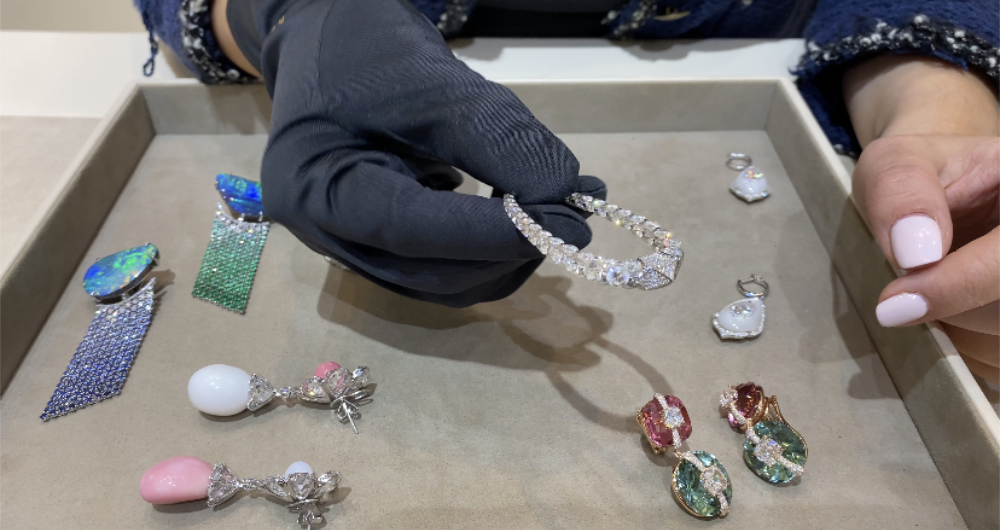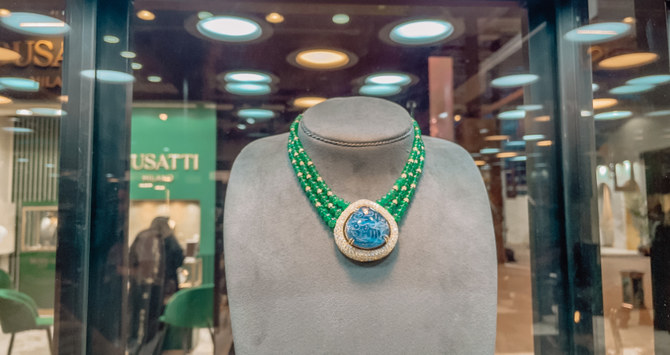RIYADH: When the Jewelry Salon opened in Riyadh in 2010, it was a hub where local female designers could display their work and grow their brands. Since then it has also developed into a regional showcase and focal point for jewelry enthusiasts, investors, and prestigious local and international businesses.
Described as offering the largest Jewelry display in the Middle East, the salon is participating in Riyadh Season and currently hosts a diverse collection of unique designs and limited pieces from businesses in more than 16 countries.
One of them is Boghossian, a Swiss, family owned jewelry company that began in Mardin in 1868 and has passed down the secrets of its unique craftsmanship and artistry through six generations. Its creations fetch record prices in international auctions, and are truly one-of-a-kind pieces featuring signature patents that cannot be copied.
Boghossian created, for example, the intricate Merveilles technique that allows more light to illuminate diamonds by greatly reducing the amount of metal used to support the gems.
“The Merveilles is something that has never been created before, and because there’s so little metal involved there is brightness all around,” Dalia Boghossian, the business’s marketing director, told Arab News, adding that it took four years of research and development to perfect the technique, which creates a seamless structure that gives the impression of a floating diamond.
“We actually have a patent for the Merveilles, so no one else creates it like we do. It’s so special because the diamonds hold one another, rather than using metal prongs.”

The Jewelry Salon hosts the world's most expensive COVID mask created by the American brand Yves.
Veschetti, an Italian, high-end, family-owned jewelry business that was founded in 1949, is visiting Riyadh for the second time and showcasing a colorful collection of hand-crafted pieces, featuring rare and precious gems, that are inspired by Italian culture.
“Through our jewelry, we share our Italian culture and beauty,” said Brescia-born Chiara Veschetti, the owner of the company. “Our experience in Saudi Arabia has been very good for many years; the Saudi people really appreciate our style. I think the Saudi and Italian people are very similar.”
Veschetti first visited the Kingdom 17 years ago, to take part in Bisat Al-Reeh, a renowned annual festival in Jeddah during Ramadan.
“It was very magical and very different from Italy, and since that time we never stopped coming, except (during the pandemic),” she said.
In Riyadh, the business is showcasing for the first time an “ancient stone,” classified as a “gemological rarity,” that was found three years ago in Myanmar.

Swiss Jeweler Boghossian created an intricate technique called the Merveilles that allows for an uninterrupted flow of light to surround the diamonds.
“We brought this necklace made with emeralds, and in the center there’s an incredible, natural Burmese sapphire with an Arabic inscription,” Veschetti said. The ancient inscription reads: “In the name of God who is the most merciful and great.”
“The organization this year in Riyadh is amazing,” she added. “There’s always a chance to collaborate more if we come more than once a year.”
Sicis Jewels, which is based in Milan, is also displaying its creations at the Jewelry Salon. The pieces are described as a blend of art and nature, incorporating brightly colored murals and shapes in a “micromosaic.”
“In the latest piece, called Destino Incantato, meaning enchanted destiny, there are precious jewels such as tanzanites and rubellites that are embellished with the micromosaic,” Gabriella Lanfranchi, the head of sales at Sicis, told Arab News.
The luxurious collection offers a departure from standard designs, with the precious stones forming a sort of wearable painting that embodies the richness of Italian culture.
“Micromosaic is an art that is being done by our best craftsmen in Ravenna, the capital of mosaic art,” Lanfranchi said. “With this collection we are perfecting the ancient art of mosaic.”
American jewelry house Harry Winston is considered an industry leader known, among other things, for its handcrafted engagement and wedding rings adorned with the most precious and rare diamonds.
“Harry Winston is one of the unique brands,” said Jamil Matar, the president of Al-Fardan Group, which has been Harry Winston’s partner in Saudi Arabia since 1992.
“It is known internationally that when (founder Harry Winston) was alive he was the smartest jeweler. He could figure out what would be produced simply looking at the rough stones, which is not easy.”
This year, the company is displaying the Harry Winston Timepieces collection of rare and limited-edition watches. The Histoire de Tourbillon and Opus collections are of particular interest to collectors who appreciate delicate clockwork mechanisms in exquisite and unique timepieces.
“We’re here at the exhibition in Riyadh counting on big customers to come,” said Matar. “And this is the time when everyone is here.”
Perhaps the showstopper on display at the Jewelry Salon, and certainly one of the most topical creations, is the world’s most expensive face mask, created by luxury brand Yvel.
“I am proud to present the world’s most expensive COVID mask,” Isaac D. Levy, the company’s president, told Arab News. “It’s an N-99, it is made out of 3,608 diamonds and took close to nine months to put it together”
The mask, which sold for $1.5 million, is on loan to the Jewelry Salon as a display piece.

















